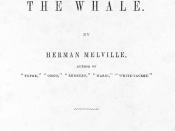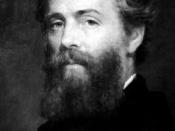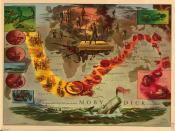Philosophers of different époques and time periods were trying to find the answer for the eternal questions: What is good and what is evil? Where is the border between these two notions? Does God exist? What is the role of man and nature? Undoubtedly, there are no precise answers, however, some interesting theories and ideas appear. In fact, it would be wrong to say that only philosophers are constant truth-searchers. Almost every person asked himself/herself similar questions at least once in a lifetime. Besides, the attempts to raise such themes were reflected in literature.
Romanticism appealed to the feelings of the individual, considering the history of mankind as the struggle between evil and good. Moreover, the Romanticist literature drew parallels and paid a lot of attention to the unity of man, God and nature. Herman Melville was one of the authors, who clearly presented this unity, emphasizing the role of every its member.
His novel Moby Dick is his quest for truth in a kind of dualistic world, where evil and good are closely connected. Moby Dick can be considered as one of the finest novels in American and world literature. It amazes with its philosophic form and allegory, although the general mood of the novel is quite pessimistic.
Melville presents different types of characters, which symbolize the light and darkness. The story is told by young Ishmael who feels tired of daily routine, absence of action in his life and quiet existence. Ishmael dreams of a sea-voyage, full of colourful adventures and sometimes danger. Finally, his dream comes true and he becomes a sailor on board the whaler Pequod, where he meets Captain Ahab and immediately gets impressed by this strange man. In fact, Ishmael combines the role of a narrator and observer. Much more attention is paid to...


